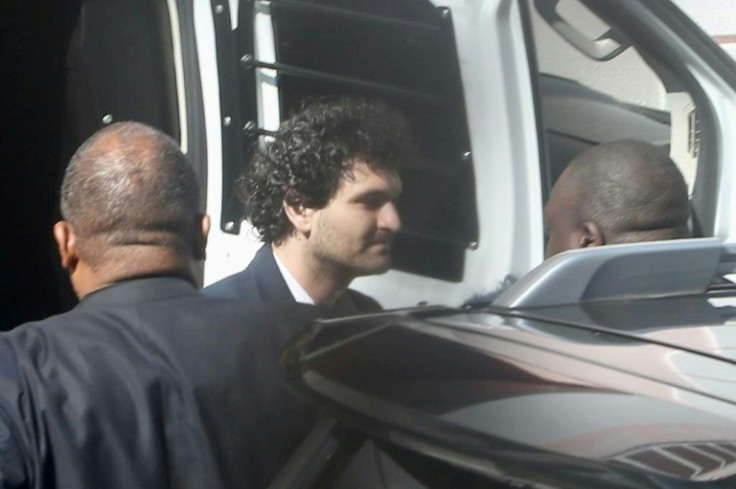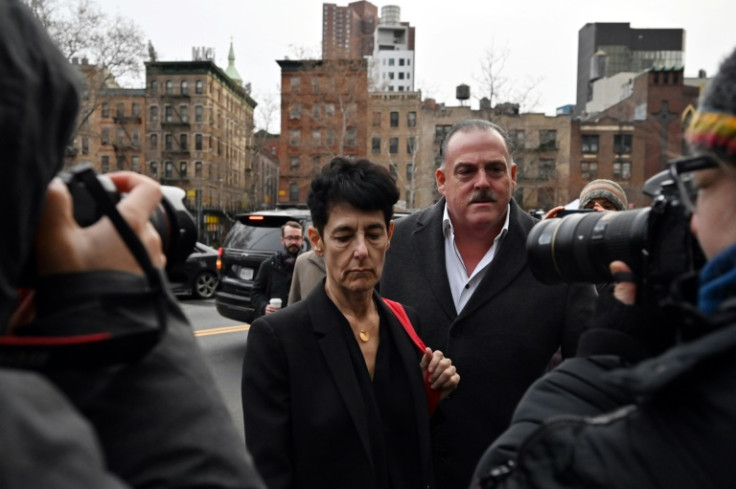FTX Boss Bankman-Fried Freed On Bail Over Fraud Charges

FTX co-founder Sam Bankman-Fried was released on $250 million bail Thursday while he awaits trial on criminal fraud charges over the spectacular collapse of his crypto exchange.
US magistrate judge Gabriel Gorenstein made the ruling during Bankman-Fried's arraignment hearing in federal court in Manhattan following his extradition from the Bahamas.
Bankman-Fried, who recently claimed to have only $100,000 left in the bank, will have to live at his parents' home in Palo Alto, California, which has been put up as collateral under the terms of release, the judge ruled.
Bankman-Fried, who entered the courtroom in shackles and appeared unshaven, did not enter a plea.
He looked down as the judge reviewed the indictment's eight criminal counts and made only a brief statement to accept the conditions of bail.
The parents, Stanford Law professors Joseph Bankman and Barbara Fried, sat silently throughout the 40-minute hearing. Bankman-Fried was later seen leaving the court carrying a brown paper bag.
Under the deal, the 30-year-old ex-billionaire, once touted as a possible future Warren Buffett, will be subjected to electronic monitoring.
FTX and its sister trading house Alameda Research went bankrupt last month, dissolving a virtual trading business that at one point had been valued by the market at $32 billion.
Prosecutors allege Bankman-Fried cheated investors and misused funds that belonged to FTX and Alameda Research customers.
The plane carrying Bankman-Fried from the Bahamas, where FTX is headquartered, arrived in the United States late Wednesday after he waived his right to challenge the US government's extradition request.
Gorenstein determined that Bankman-Fried posed minimal risk of flight because he did not challenge extradition and has no prior convictions, accepting a recommendation from prosecutors.
Nicolas Roos, an Assistant US Attorney in the Southern District of New York, described Bankman-Fried's alleged schemes as of "epic proportions," with the government already holding "very strong" evidence from more than a dozen cooperating witnesses and encrypted text messages.
But Roos recommended bail with "highly restrictive" conditions in light of the defendant's lack of criminal history and the fact that he had voluntarily agreed to be extradited.
Defense attorney Mark Cohen told Gorenstein that Bankman-Fried "voluntarily" came to New York.
"He wants to address these charges," Cohen said. "We think that's a very compelling factor."
Federal prosecutors last week charged Bankman-Fried with conspiracy, wire fraud, money laundering and election finance violations.
He "was orchestrating a massive, years-long fraud, diverting billions of dollars of the trading platform's customer funds for his own personal benefit and to help grow his crypto empire," they said.
Five of the eight counts against Bankman-Fried carry a maximum sentence of 20 years in prison each.
The US Securities and Exchange Commission has separately accused him of violating securities laws.
Bankman-Fried's appearance came after US attorney Damian Williams announced late Wednesday that two key figures in the case -- Alameda Research CEO Caroline Ellison and FTX co-founder Gary Wang -- had pleaded guilty to charges related to the FTX collapse and that they were cooperating with authorities.
Their charges were "in connection with their roles in the frauds that contributed to FTX's collapse," he said, without providing further details.
Separately, the SEC and the Commodity Futures Trading Commission (CFTC) announced Wednesday they had filed civil suits against Ellison and Wang.
The CFTC estimates that $8 billion in funds were misappropriated from FTX customer accounts.
After its founding in 2019, FTX rose spectacularly to become a leading player in the crypto world.
Bankman-Fried appeared on the covers of finance and tech magazines, and drew in huge investments from prominent fund managers and venture capitalists.
But it all imploded dramatically in November when a media report said Alameda's balance sheet was heavily built on a token created by FTX with no independent value -- and exposed Bankman-Fried's companies as being dangerously interlinked.
Bankman-Fried was arrested at his Nassau apartment on December 12 at the request of the federal prosecutors in New York.
A Bahamas permanent resident, he spent nine days in prison, weighing his choices before telling the Nassau magistrate court Wednesday that he would not fight extradition.

© Copyright AFP 2025. All rights reserved.





















